| Srl | Item |
| 1 |
ID:
132298
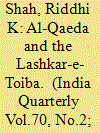

|
|
|
|
|
| Publication |
2014.
|
| Summary/Abstract |
Study of ideology is one of the most important domains of consideration for a successful counter-terrorism strategy. It is necessary to know and understand the ideology of a terrorist outfit coupled with the ongoing evolution at the same, its chief ideologues and its target audiences in order to provide an alternative ideology or in other words to win the 'hearts and the minds' of the people. This article traces the mounting similitude in the discourse and the actions of Lashkar-e-Taiba and the ideology of Al-Qaeda. The article begins with a brief depiction of the debate on the 'end of ideology' before proceeding on to an examination of Al-Qaeda's ideology. In the next section, LeT's discourse and actions from 1990 to 2010 are scrutinised followed by an analysis that attempts to draw out parallels between the ideologies of the two terrorist organisations. In the last section, the conclusion raises several pertinent points for the consideration of counter-terrorist specialists and policy makers.
|
|
|
|
|
|
|
|
|
|
|
|
|
|
|
|
| 2 |
ID:
132307
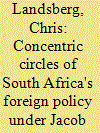

|
|
|
|
|
| Publication |
2014.
|
| Summary/Abstract |
South Africa's foreign policy could be viewed as a set of concentric circles which define the Republic's international priorities. In an attempt to bring coherence and predictability to them, the Zuma government has tried to learn from its predecessor, the Mbeki government (1999-2008), by putting emphasis on key international relations and concerns, and the idea was suggested that these different layers reinforced each other.
According to stated policy, pursuit of the national interests lay at the heart of the Republic's international strategies and came to be regarded as the new glue that holds it together, albeit it is four years into Zuma's government and the 'national interest' remains poorly developed and in need of expansion and implementation. A set of wider foreign policy concentric circles informs foreign policy, championed as 'Pursuing African Advancement and Enhanced Cooperation'. This agenda was to be pursued under a series of sub-goals or sub-categories, for our purposes concentric circles, namely (a) closing the gap between domestic and foreign policy; (b) continued prioritisation of the African continent-the Mbeki government called it African Agenda, or Africa first policy; (c) strengthening South-South relations; (d) strategic relations with strategic formations for the North; (e) participating in the global system of governance and (f) strengthening political and economic relations. While these six pillars were clearly developed on paper, and self-standing, how they all relate to the epicentre of the national interest and overlap one another is not so clear. More serious effort is needed on the part of government to close this lacuna, and the idea of coherence between them should not be assumed if there is to be consistency between them and the stated annulus of national interest.
|
|
|
|
|
|
|
|
|
|
|
|
|
|
|
|
| 3 |
ID:
132306
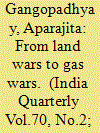

|
|
|
|
|
| Publication |
2014.
|
| Summary/Abstract |
Chile and Bolivia have been intertwined in a complex relationship of hostility and cooperation for over a century. Since the Bolivian defeat in the War of the Pacific and the Treaty of Peace and Friendship of 1904, issues of resource sharing and Bolivia's sovereign access to sea on the Pacific side have altered the dynamics of such a relationship. Indeed, they appear to be the major stumbling blocs to attempts at normalisation of relations between the two Andean neighbours. In the recent years, Chile-Bolivia relations have been strained over the issue of gas. Bolivia's political volatility over gas and Chile's refusal to discuss the issue of access to the sea were viewed as being part of the same quagmire of relations. However, despite disparities in development between the two countries, globalisation has altered the context of mutual engagement. Against this backdrop, the article specifically looks at one such contemporary issue of bilateral contestation, that is, the gas issue. The article will examine its geo-economic significance in the larger context of regional cooperation and energy security. It intends to probe the plausibility of the argument that the gas issue has the promise and potential to lighten the sedimented antagonism between the two.
|
|
|
|
|
|
|
|
|
|
|
|
|
|
|
|
| 4 |
ID:
132299
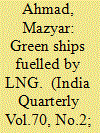

|
|
|
|
|
| Publication |
2014.
|
| Summary/Abstract |
This article seeks to understand some legal aspects surrounding 'green shipping' in India. Pollution caused by ships in their daily operations or when they are scrapped is causing concern world over. That necessitates ways and means of addressing the issue as well as future of greener shipping operations. Coastal shipping has being neglected in India for a long time. We also need adequately comprehend importance of coastal shipping and the role it could play in the economic development of India. This study tries to establish a relationship between 'green shipping' and possible growth of coastal shipping in India. Green shipping is the need of the future for providing green and sustainable transport of goods around the Indian coast as well as beyond it. Use of LNG as fuel and advantages India will have in switching over to LNG, international regulations governing LNG ships and their transposition in domestic laws as well as construction, operation and other facilities associated with LNG fuelled ships in India have been sought to be addressed.
|
|
|
|
|
|
|
|
|
|
|
|
|
|
|
|
| 5 |
ID:
132300
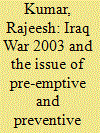

|
|
|
|
|
| Publication |
2014.
|
| Summary/Abstract |
The adoption of pre-emptive self-defence as a policy by the United States of America in its war against terrorism has revived the controversy over the concept of pre-emptive use of force in international politics. Some scholars argue that states are stretching the right of self-defence as pre-emptive, preventive and anticipatory in accordance with their needs and interests and to justify their actions. For others, in the context of changing security threats such as terrorism and Weapons of Mass Destruction pre-emptive strikes are permissible. These efforts to redefine and re-interpret the right of self-defence and use of force for justifying state's actions have challenged the role of international organisations that were principally designed to regulate the unilateral use of force, and to maintain international peace and security. Against this backdrop, this article will examine how the pre-emptive and preventive use of force undermines the role of the United Nations in international politics through probing the case of Iraq War 2003. This would be a much needed reflection on the implications of Iraq War on multilateralism in the context of 10 years after the war.
|
|
|
|
|
|
|
|
|
|
|
|
|
|
|
|